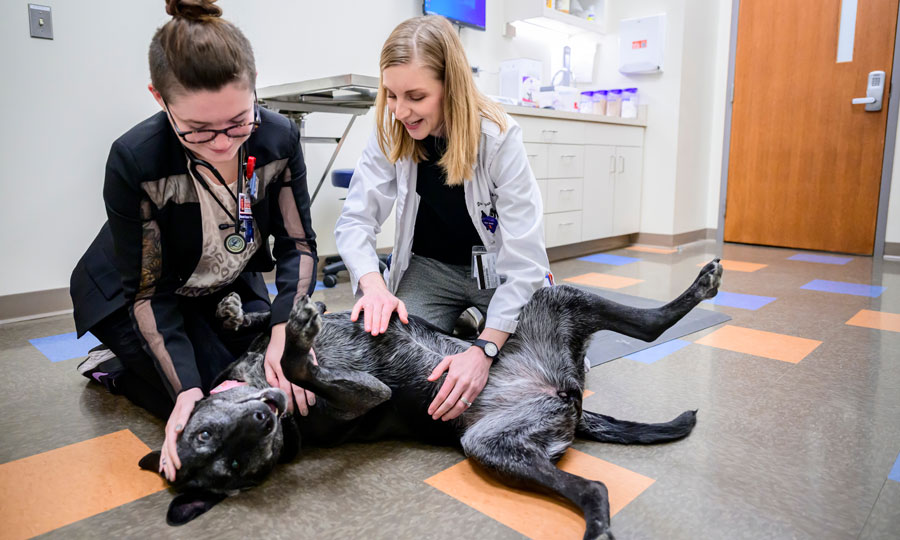Splenic Torsion Requires Surgery
For about a week in early September, Rex, a canine officer with the Decatur Police Department, had been lethargic and not himself. His handler took Rex several times to see the local veterinarian, who, after obtaining abdominal radiographs that were concerning for a splenic issue, recommended a trip to the emergency room at the University of Illinois Veterinary Teaching Hospital in Urbana.
When Rex arrived at the emergency service, he was quiet but alert and responsive. The emergency team noticed that his temperature was a high and his blood pressure was elevated. During his physical exam, it was noted that he seemed to be uncomfortable when his abdomen was palpated. Given the concern for an abdominal issue, the emergency clinicians recommended an abdominal ultrasound.
Diagnosis: Splenic Torsion
The ultrasound revealed changes that indicated splenic swelling and loss of splenic blood flow. It also showed free fluid in the abdomen, and enlarged lymph nodes around the abdominal area.
The diagnosis: acute splenic torsion, meaning the tissue that attaches the spleen to the abdomen had twisted in a way that had cut off the blood supply to the spleen. This problem needs to be swiftly managed, ideally through surgery.
Dr. Hadley Gleason, a veterinarian completing a residency in small animal surgery, was on the case. She explains, “The surgical approach is pretty straightforward: remove the spleen.”
Care must be taken to prevent the spleen from untwisting, which can release thrombi (blood clots) and vasoactive compounds into the body that can negatively affect blood pressure and heart rate.
During the surgery Dr. Gleason also performed a procedure called a gastropexy, in which the stomach is surgically affixed to the abdominal wall to prevent the stomach from rotating out of position if bloat occurs. The term for this disorder is gastric dilatation and volvulus (GDV). “Gastric dilatation” is the medical term for bloat, a life-threatening problem where the stomach expands with gas; “volvulus” refers to the rotation of the stomach so that the openings at either end are closed off, preventing gas from escaping and leading to life-threatening compression of the large abdominal blood vessels.
Connections Between Bloat and Splenic Torsion
“There have been associations between of dogs developing gastric dilatation and volvulus following splenectomy, and dogs developing splenic torsion after GDV,” explains Dr. Gleason.
Both splenic torsions and GDVs are most frequently seen in large, deep-chested dogs. It is thought that splenic torsions may occur in conjunction with spontaneously resolving GDV, perhaps because the ligaments that hold the spleen in place are stretched out during the gastric dilatation, predisposing the spleen to twist.
“After the surgery, Rex received the standard care for recovery from abdominal exploratory surgery as well as cardiac monitoring, because arrhythmias may develop as a result of splenic disease,” says Dr. Gleason. “He was in the intensive care unit for 48 hours with heart monitoring and pain medication, but he bounced right back and was eating the next day.”
Good Prognosis, If No Heart Complications
The outlook for dogs that have had a splenectomy is generally good, depending mostly on whether the patient experiences heart trouble after surgery.
“Those thrombi and vasoactive compounds can wreak havoc if released into the body during the splenectomy, so we were very happy that Rex did so well after surgery,” says Dr. Gleason.
Thanks to the astute observations of Rex’s handler and primary care veterinarian, as well as the quick action of the emergency and surgery teams at the Veterinary Teaching Hospital, Rex completely recovered and is back at work assisting local law enforcement.
If you have questions about splenic torsion, contact your local veterinarian.
By Hannah Beers
Feature photo by Dr. Ashley Mitek shows fourth-year veterinary student Angela Krzmarzick and Dr. Hadley Gleason with Rex and his handler, Officer Chris Snyder, after Rex was discharged.

![[Rex the police dog goes home from the hospital]](https://vetmed.illinois.edu/wp-content/uploads/2021/04/pc-gleason-rex.jpg)


